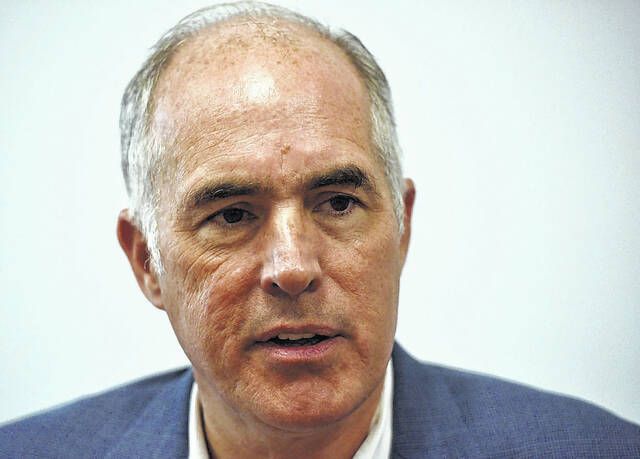Click here to subscribe today or Login.
WILKES-BARRE — Gov. Tom Wolf this week was joined by state and local officials and older Pennsylvanians to celebrate recently signed legislation to expand eligibility in the Pharmaceutical Assistance Contract for the Elderly (PACE) and the Pharmaceutical Assistance Contract for the Elderly Needs Enhancement Tier (PACENET) programs.
“Ensuring that older Pennsylvanians have access to necessary services, including quality health care and affordable prescription drugs, is a priority of my administration,” Gov. Wolf said. “I commend the legislature, especially bill sponsors Reps. Wendi Thomas and Steve Samuelson, for working with my administration on this critical issue and passing this legislation. Programs like PACE and PACENET serve as a lifeline for hundreds of thousands of older adults who need assistance with paying for their prescription medications and provide critical support to older Pennsylvanians.”
On Dec. 22, Gov. Wolf signed into law Act 92 of 2021 and Act 94 of 2021, both priorities for the Pennsylvania Department of Aging.
— Act 92 of 2021 extends the moratorium until December 31, 2023, allowing enrollees to maintain their PACE benefits despite disqualifying increases in their overall income due to Social Security cost-of-living adjustments. The original moratorium was set to expire December 31, 2021.
— Act 94 of 2021 expands the income eligibility limits for PACENET by $6,000 and removes the PACENET premium clawback, which will result in premium cost savings for some enrollees. The clawback will only apply to those individuals enrolled in the program’s Part D partner plans. This will reduce the premium obligation for about 28,000 individuals.
PACE and PACENET currently enroll more than 250,000 older Pennsylvanians. The income limit expansions mean that an additional 100,000 older adults are now eligible with an expected 20,000 older adults expected to enroll in 2022. Enrollment begins in February.
The governor was joined by Aging Secretary Robert Torres, and PACE Director Tom Snedden.
“The PACE program plays an important role in supporting our growing older adult population by helping them pay for their prescription medications at significant savings. Thanks to the sponsorship and leadership that guided the passage of this important legislation, more older Pennsylvanians will be able to get life-sustaining medications and keep money in their pocket, which helps them be able to keep living independently in their own homes with a better quality of life,” said Secretary of Aging Robert Torres. “The PACE Program is a true example of government that works.”
“My administration is committed to ensuring that older adults have access to all of the resources and programs they need, and we will continue to invest in the programs that give older adults the freedom to live their life how they choose as they age,” said Gov. Wolf.
State Police seized more than
$72 Min illegal drugs in 2021
Pennsylvania State Police (PSP) troopers seized $72,004,713 worth of cocaine, heroin, fentanyl, methamphetamines, and other illicit drugs throughout 2021, including $9,557,561 in the fourth quarter.
For the year, troopers seized more than 1,000 pounds of cocaine, 733 pounds of methamphetamines, 551 pounds of fentanyl, 55 pounds of heroin and 247,000 pills of assorted narcotics.
In the fourth quarter, PSP seized more than 141 pounds of cocaine, 133 pounds of methamphetamines, and over 25,000 opioid pills.
State police collected 3,484 pounds of prescription and other medication as part of its drug take-back program throughout 2021, including 865 pounds in the fourth quarter.
There are 65 drug take-back boxes at state police stations throughout the commonwealth, providing a safe way to dispose of unused or unwanted medication 24 hours a day, seven days a week.
Casey, Scott unveil bipartisan
report on financial literacy
As 2022 begins, U.S. Senators Bob Casey (D-Scranton) and Tim Scott (R-SC), Chairman and Ranking Member of the U.S. Senate Special Committee on Aging, are urging seniors and people with disabilities to make a New Year’s resolution to prepare for anticipated financial decisions.
The senators this week unveiled a new, bipartisan report entitled, “Financial Literacy in Retirement: Providing Just-in-Time Information and Assistance to Older Americans and People with Disabilities.”
The report examines the real-time information and help older Americans and people with disabilities need as they face changes in their lives, known as “just-in-time” financial literacy. The Senators also held a hearing on this topic, which highlighted the report and a brochure for consumers to help them navigate these decisions.
“This year, more than 10,000 Americans will turn 65 every day,” Casey said. “Around kitchen tables all across the country, retirees and seniors are asking: ‘Should I take my Social Security or should I wait?’ and ‘Do I need to sign up for Medicare, or can I wait?’ These are not simple decisions. As we begin 2022, I urge seniors to make a New Year’s resolution — take stock of your finances and get prepared for these upcoming decisions.”
Scott added, “Financial literacy is key to making the most out of the financial opportunities our country has to offer. And much like education, it never loses its power — no matter your stage of life. This report will help empower seniors to make wise financial decisions, laying the groundwork for security and peace of mind in their golden years.”
The report identifies the six common decisions that require, and can benefit from, this kind of financial literacy: claiming Social Security, enrolling in Medicare, annuitizing a 401(k), giving to charity, downsizing a home and responding to a natural disaster.
The hearing highlighted the importance of President Biden’s December 2021 executive order to enhance customer experiences across federal agencies and align services to support people at critical decision points in their lives, like turning 65.
This executive order expands retirees’ ability to claim Social Security benefits online, receive updates on their application status and access personalized online tools for Medicare enrollment and coverage options.
Treasurer Garrity announces increased
contribution limit for PA ABLE accounts
Treasurer Stacy Garrity this week announced that the annual contribution limit for PA ABLE has increased to $16,000 — the first increase since 2018.
The change comes as a result of changes in the IRS regulations, responding to inflation. The previous limit was $15,000.
“PA ABLE empowers thousands of Pennsylvanians with disabilities to live more independently by saving their own money without hurting their eligibility for critical services,” Garrity said. “This increase in the contribution limit expands opportunities for our friends and family with disabilities.”
PA ABLE accounts offer tax-advantaged savings options to people with qualifying disabilities, so they can save and build assets without affecting eligibility for means-tested federal and state benefits such as Supplemental Security Income (SSI, savings up to $100,000) and Medical Assistance. Savings can be used for disability-related expenses, including day-to-day expenses like groceries, rent and healthcare, or longer-term expenses like education and assistive technology.
PA ABLE offers seven different savings options, including a checking account with a free debit card. Contributions of up to $16,000 per year can be deducted on PA state income taxes, and PA ABLE account owners pay no federal or state income tax on account growth or qualified withdrawals.
The federal ABLE (Achieving a Better Life Experience) Act of 2014 gave states the authority to create ABLE programs. PA ABLE started in 2017, and is now the largest program in the 19-member National ABLE Alliance, accounting for more than 25% of Alliance assets. More than 5,900 PA ABLE account owners have saved over $68 million for disability expenses.
To be eligible for PA ABLE, a person’s disability must be onset prior to their 26th birthday. The ABLE Age Adjustment Act, proposed legislation in Congress that Garrity strongly supports, would increase the age of disability onset to 46.
“I urge every Pennsylvanian to reach out to their representatives in Washington to let them know the ABLE Age Adjustment Act should be passed as soon as possible,” Garrity said. “Expanding access to ABLE would help increase financial independence for millions of Americans, including an estimated one million veterans.”
To learn more about how to save with PA ABLE and program eligibility, visit paable.gov, call 855-529-ABLE (2253), or register for an upcoming webinar at paable.gov/webinar.
Reach Bill O’Boyle at 570-991-6118 or on Twitter @TLBillOBoyle.











